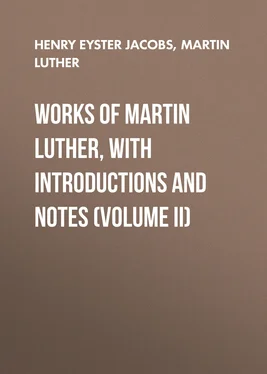Henry Eyster Jacobs - Works of Martin Luther, with Introductions and Notes (Volume II)
Здесь есть возможность читать онлайн «Henry Eyster Jacobs - Works of Martin Luther, with Introductions and Notes (Volume II)» — ознакомительный отрывок электронной книги совершенно бесплатно, а после прочтения отрывка купить полную версию. В некоторых случаях можно слушать аудио, скачать через торрент в формате fb2 и присутствует краткое содержание. Жанр: foreign_prose, foreign_religion, Философия, foreign_psychology, foreign_antique, на немецком языке. Описание произведения, (предисловие) а так же отзывы посетителей доступны на портале библиотеки ЛибКат.
- Название:Works of Martin Luther, with Introductions and Notes (Volume II)
- Автор:
- Жанр:
- Год:неизвестен
- ISBN:нет данных
- Рейтинг книги:3 / 5. Голосов: 1
-
Избранное:Добавить в избранное
- Отзывы:
-
Ваша оценка:
- 60
- 1
- 2
- 3
- 4
- 5
Works of Martin Luther, with Introductions and Notes (Volume II): краткое содержание, описание и аннотация
Предлагаем к чтению аннотацию, описание, краткое содержание или предисловие (зависит от того, что написал сам автор книги «Works of Martin Luther, with Introductions and Notes (Volume II)»). Если вы не нашли необходимую информацию о книге — напишите в комментариях, мы постараемся отыскать её.
Works of Martin Luther, with Introductions and Notes (Volume II) — читать онлайн ознакомительный отрывок
Ниже представлен текст книги, разбитый по страницам. Система сохранения места последней прочитанной страницы, позволяет с удобством читать онлайн бесплатно книгу «Works of Martin Luther, with Introductions and Notes (Volume II)», без необходимости каждый раз заново искать на чём Вы остановились. Поставьте закладку, и сможете в любой момент перейти на страницу, на которой закончили чтение.
Интервал:
Закладка:
Of like significance is Luther's advocacy of the separation of the temporal and spiritual powers, practically of Church and State,—the position which he develops later in the Open Letter to the Nobility . But in this treatise, again, Luther shows himself to be anything but the immoral monster his vilifiers have tried to make of him. He is again the man of conscience—will his critics say, "of oversensitive conscience"? Thank God that there were some sensitive consciences in an almost conscienceless age! Luther fears sin more than the ban, and sin has for him more than an ecclesiastical meaning. Sin is not primarily an act against the Church, but an offence against God. This the ban is to teach; it is to be the symbol of God's wrath against sin and it is to be used by the Church only remedially and in love. When so used it becomes the chastening rod of the dear Mother Church, provided it be accepted and borne in this spirit.
Why, then, did not Luther bear his own ban in this way? The justification for his subsequent conduct is to be found in two brief but important conditional clauses in this treatise. "God," he says, "cannot and will not permit authority to be wantonly and impudently resisted, when it does not force us to do what is against God or His commandments ." 49 49 See below, p. 50.
Again he says, "When unjustly put under the ban we should be very careful not to do, omit, say or withhold that on account of which we are under the ban, unless we cannot do so without sin and without injury to our neighbor ." 50 50 See below, p. 51.
God and his neighbor were for Luther the actors which made it necessary for him to speak and act, when for selfish reasons he would often rather have remained passive.
The inception of our treatise is to be found in a sermon preached in Wittenberg in the spring of 1518. Luther's pastoral concern for his people made it necessary for him to speak on this subject in order to quiet the consciences both embittered and distressed by the wanton and unjust use of the power of excommunication. Added to this must have been his own personal interest in the ban certain to fall on him. In a letter to Link 51 51 See Enders, I, No. 84. Smith. Luther's Correspondence , I, No. 69.
, dated July 10, 1518, he speaks of having preached a sermon on the power of the ban which produced general consternation and fear that the ire enkindled by the XCV Theses would start afresh. He had desired a public disputation on the subject, but the Bishop of Brandenburg persuaded him to defer the matter. Under date of September 1st, Luther writes Staupitz 52 52 See Enders, I, No. 90. Smith, Luther's Correspondence , I, No. 77.
that because his sermon had been misrepresented and spread by unfriendly spies it became necessary for him to publish it. It appeared in August after Luther's summons to Rome, under the title De Virtute Excommunicationis . Our treatise is an elaboration in popular form of this Latin treatise of 1515.
The Grünberg text given in Clemen, Vol. I, which we have followed in most cases, is dated 1520, and must have appeared in its original edition at the end of 1519 or the beginning of 1520.
The text of the treatise is found in the following editions: Weimar Ed., vol. vi, 63; Erlangen Ed., vol. xxvii, 51; Walch Ed., vol. xix, 1089; St. Louis Ed., vol. .xix, 884; Clemen, vol. i, 213; Berlin Ed., vol. iii, 291.
J. J. SCHINDEL.
Allentown, PA.
A TREATISE CONCERNING THE BAN
JESUS
1 . We have seen 53 53 In the preceding treatise on the Blessed Sacrament .
that the sacrament of the holy body of Christ is a sign of the communion of all saints, therefore it becomes necessary to know also what the ban is which is employed in the Church by the power of the spiritual estate. For its chief and peculiar function and power is to deprive guilty Christians of the holy sacrament and forbid it to them. Therefore the one cannot be understood apart from the other, because the one is the opposite of the other; for the Latin word communio means fellowship, and thus do the learned designate the Holy Sacrament. Its opposite is the word excommunicatio , which means exclusion from this fellowship, and so the learned term the ban.
2. There is a twofold fellowship, corresponding to the two things in the sacrament, the sign and the thing signified, as was said in the treatise 54 54 See above, p. 10.
. The first is an inner, spiritual and invisible fellowship of the heart, by which one is incorporated by true faith, hope and love in the fellowship of Christ and of all the saints, signified and bestowed in the sacrament; and this is the effect and virtue of the sacrament. This fellowship can neither be given nor taken away by any one, be he bishop, pope, or angel or any creature. God alone through His Holy Spirit must pour it into the heart of the one who believes in the sacrament, as was said in the treatise 55 55 See above, p. 18.
. This fellowship no ban can touch or affect, but only the unbelief or sin of the person himself; by these he can excommunicate himself, and thus separate himself from the grace, the and salvation of the fellowship. This St. Paul proves in Romans viii: "Who shall separate us from the God? Can anguish or need, or hunger or poverty, or danger or persecution, or shedding of blood? Nay, I am convinced that neither death nor life, neither angels nor principalities nor angelic hosts, neither things present nor things to come, naught that is mighty on the earth, neither height nor depth nor any other creature can separate us from the love of God which is ours in Christ Jesus our Lord." [Rom. 8:35, 38] And St. Peter says: "And who is he that will harm you, if ye be followers of that which is good?" [1 Peter 3:13]
3. The second kind of fellowship is an outward, bodily and visible fellowship, by which one is admitted to the Holy Sacrament and receives and partakes of it together with others. From this fellowship or communion bishop and pope can exclude one, and forbid it to him on account of his sin, and that is called putting him under the ban. This ban was much in vogue of old, and is now known as the lesser ban. For the ban goes beyond this and forbids even burial, selling, trading, all association and fellowship with men, finally, as they say, even fire and water 56 56 I. e., the necessaries of life.
, and this is known as the greater ban.
Not satisfied with this, there are some who go still farther and use the temporal powers against those under the ban, to coerce them with sword, fire, and war 57 57 E. g., the crusades against heretics, and the inquisition of the thirteenth century. Luther's statement that to burn heretics is contrary to the will of the Holy Spirit was condemned in the Bull Exsurge Domine , of July 15, 1520.
. These, however, are new inventions, rather than the real meaning of Scripture. To wield the temporal sword belongs to the emperor, to kings, to princes, and to the rulers of this world, and by no means to the spiritual estate 58 58 Cf. p. 53.
, whose sword is not to be of iron, but the sword of the Spirit, which is the Word and commandment of God, as St. Paul says. [Eph. 6:17]
4. This external ban, both the lesser and the greater, was instituted by Christ when He said in Matthew xviii: "If thy brother shall trespass against thee, go and tell him his fault between thee and him alone: if he shall hear thee, thou hast gained thy brother. If he will not hear thee, then take with thee one or two more, that in the mouth of two or three witnesses every word or transaction may be established. If he will not hear them, then tell it unto the whole congregation, the Church. If he neglect to hear the Church, let him be unto thee a heathen man and a publican." [Matt. 18:15 ff.]
Читать дальшеИнтервал:
Закладка:
Похожие книги на «Works of Martin Luther, with Introductions and Notes (Volume II)»
Представляем Вашему вниманию похожие книги на «Works of Martin Luther, with Introductions and Notes (Volume II)» списком для выбора. Мы отобрали схожую по названию и смыслу литературу в надежде предоставить читателям больше вариантов отыскать новые, интересные, ещё непрочитанные произведения.
Обсуждение, отзывы о книге «Works of Martin Luther, with Introductions and Notes (Volume II)» и просто собственные мнения читателей. Оставьте ваши комментарии, напишите, что Вы думаете о произведении, его смысле или главных героях. Укажите что конкретно понравилось, а что нет, и почему Вы так считаете.












